On March 15, 2019, Vietnam Report JSC officially announced Top 10 Prestigious Real Estate Companies in 2019.
This is an independent research result of Vietnam Report, built on scientific and objective principles. The prestige of companies is assessed based on the research on the impact of financial factors, business image from the mass media and evaluation of industry experts, specifically including: (1) Financial capacity is shown in the most recent financial statements (total assets, total revenue, profit, capital use efficiency...); (2) Media prestige is evaluated by Media Coding method – encoding articles related to the company on influential media channels; (3) Survey of industry experts; Survey of residents living and working in big cities: Hanoi, Da Nang and Ho Chi Minh city on the level of satisfaction with real estate products/services. Besides, the business survey on the operation situation, number of projects, progress of project handover, etc... in 2018 – 2019 is also used as an additional factor to determine the position of enterprises in the industry.
List 1: Top 10 Most Reputable Property Developers 2019
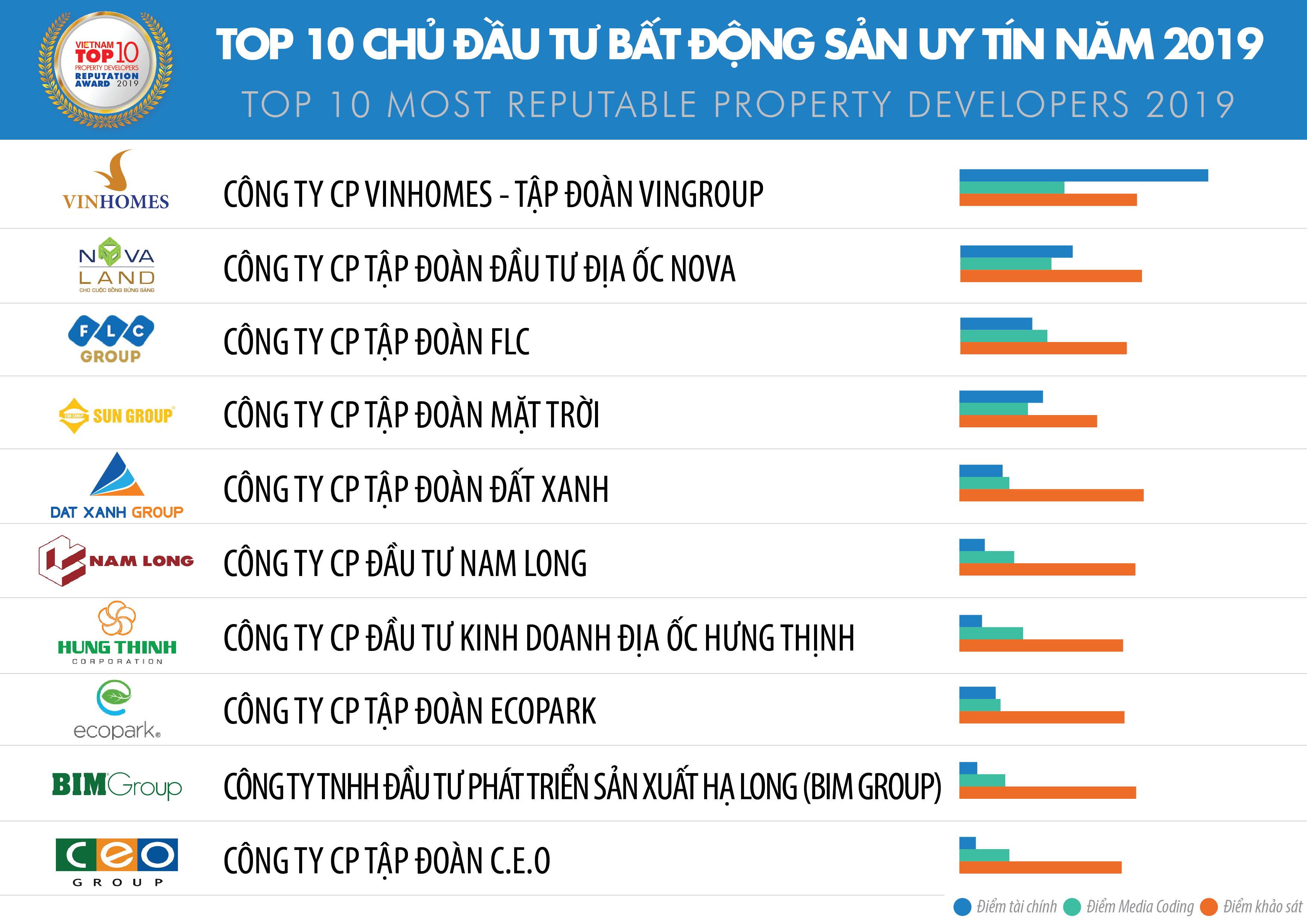
Source: Vietnam Report, Top 10 Reputable Real Estate Companies 2019, March 2019
List 2: Top 5 Most Reputable Real Estate Agencies 2019
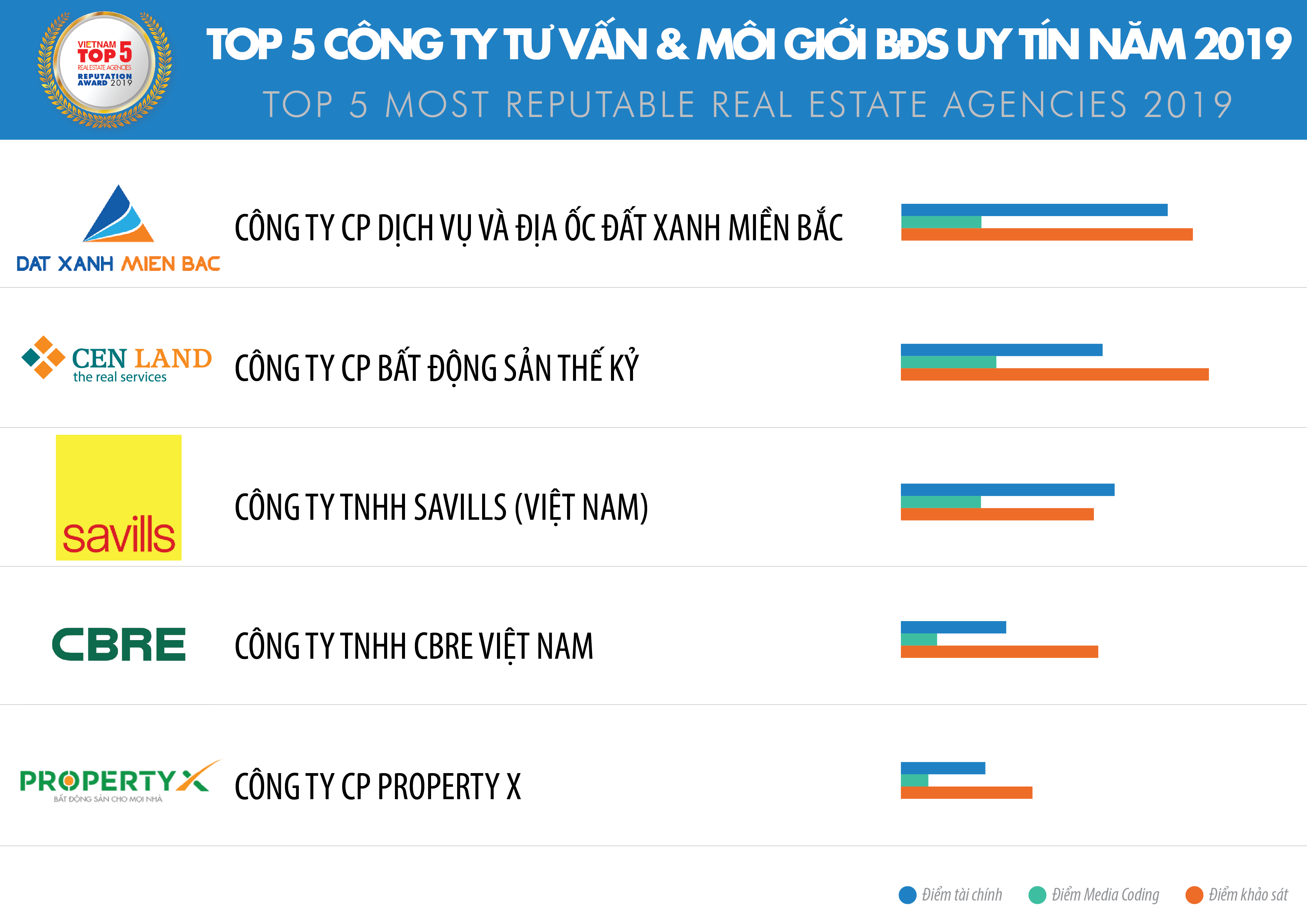
Source: Vietnam Report, Top 10 Reputable Real Estate Companies 2019, March 2019
Vietnam Real Estate - Looking back a year
2018 continued to be considered a favorable year for Vietnamese real estate, boosted by the following factors: (i) GDP per capita growth; (ii) Increase in production activities and tourism boom; (iii) Development of condominiums with medium prices: affordable prices, good liquidity; (iv) Increase in real estate investment demand of foreign developers; (v) Reduce in mortgage interest rates; (vi) Rapid development of coastal cities.
However, 2018 also saw many events that made real estate developers and businessmen become fear. The production shift by foreign developers into Vietnam and the demand of seeking land for real estate investment (especially industrial zone real estate) increased the competition level with domestic enterprises, most evidently expressed by the trend of bottom land and industrial land in Ho Chi Minh, Long An, Ba Ria - Vung Tau, Da Nang and economic zones of Northern Van Phong, Van Don and Phu Quoc. At the same time, local authorities, ministries and branches have been promoting the review of use of public land and the inspection of land allocation in large projects, causing issue of project legality to become more difficult. Many problems arose after the project has been completed such as the progress of granting Certificate of Ownership, the establishment of Management Board, separate and general disputes, maintenance fund, security, safety,... also cause difficulties for developers. According to the representatives of developers participating in the survey of Vietnam Report, the administrative procedures, legal documents were the biggest obstacles for enterprises when implementing and operating projects.
Biggest difficulties of developers when deploying and operating the project
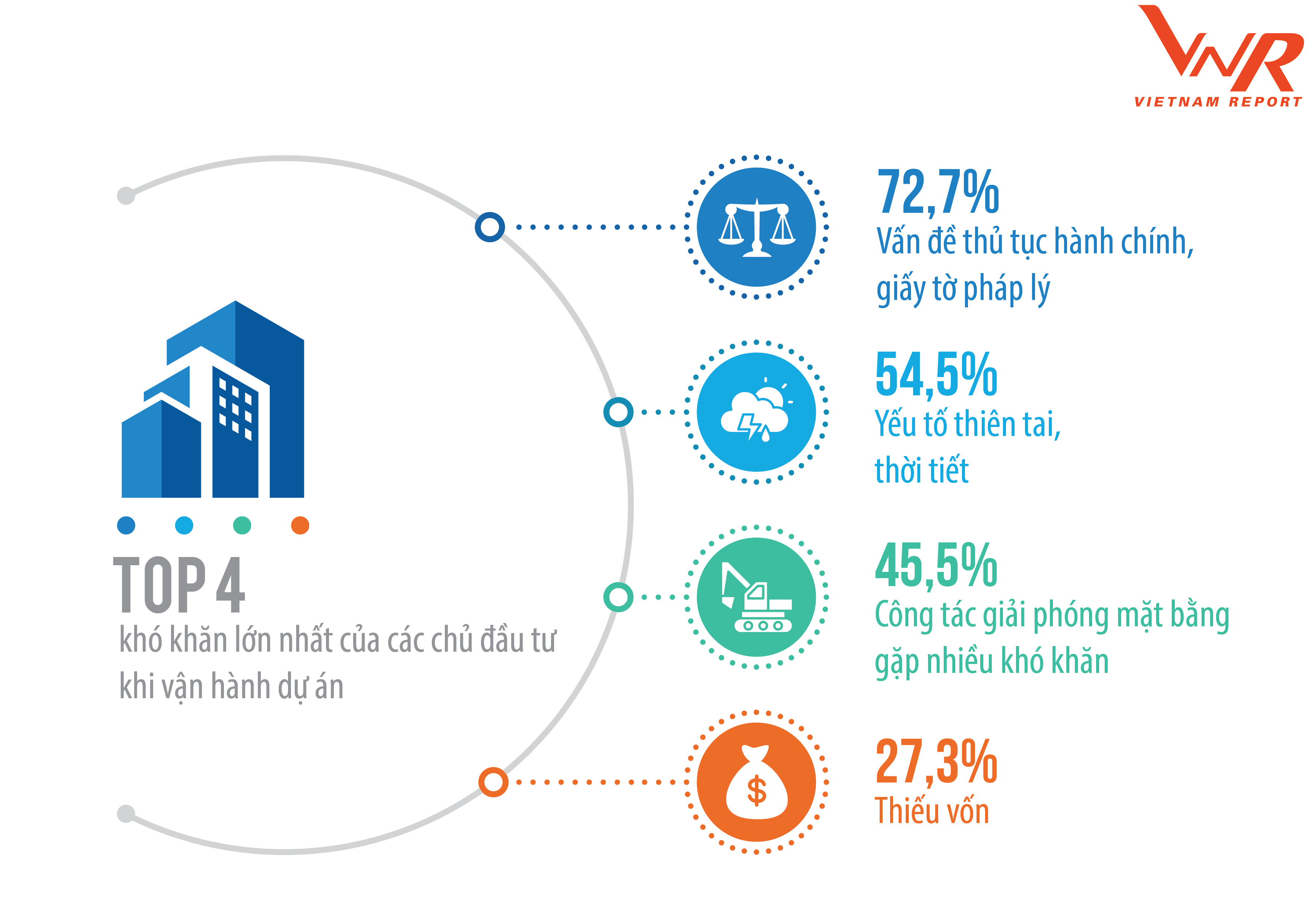
Source: Vietnam Report, Survey of Vietnam real estate enterprises in 2019, February 2019
In general, Vietnam real estate in 2018 has still grown but at the permitted threshold. This is also a general assessment of the enterprises in the industry when nearly 50% of enterprises said that the overview of the real estate market changes "slightly better" than that in 2017.
Evaluation of investment and business environment of real estate industry in 2018
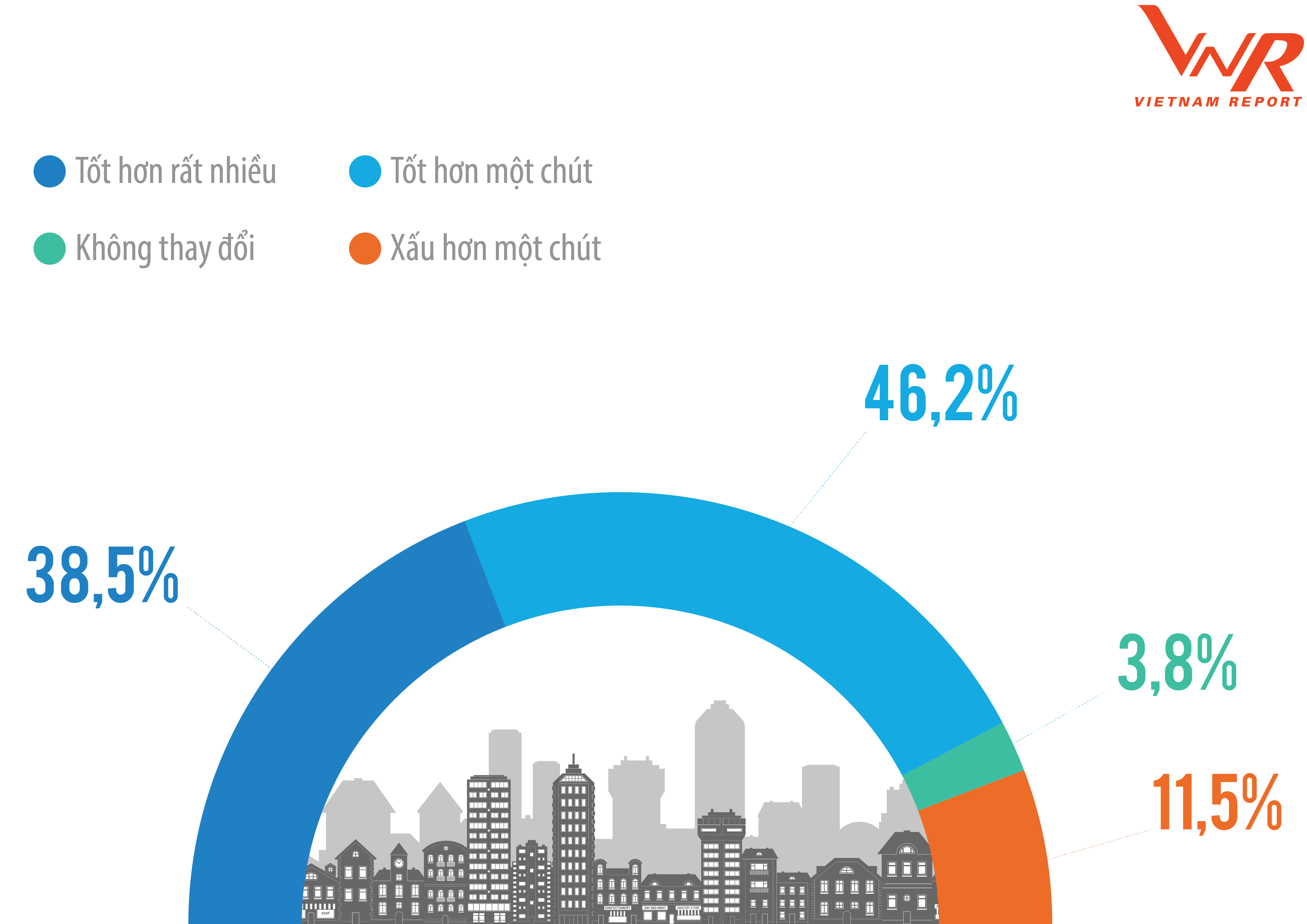
Source: Vietnam Report, Survey of Vietnam real estate enterprises in 2019, February 2019
2019: Strong branding opportunities for real estate developers
When the market is forecasted to grow "lightly", it is time for enterprises investing and trading in real estate to focus on building brand and reputation instead of investing to expand market share. According to the recent survey of real estate clients of Vietnam Report, more than 90% of clients said that "the prestige of developers" was the most influential factor to decide to buy house.
Factors that affect house-buying decision of clients
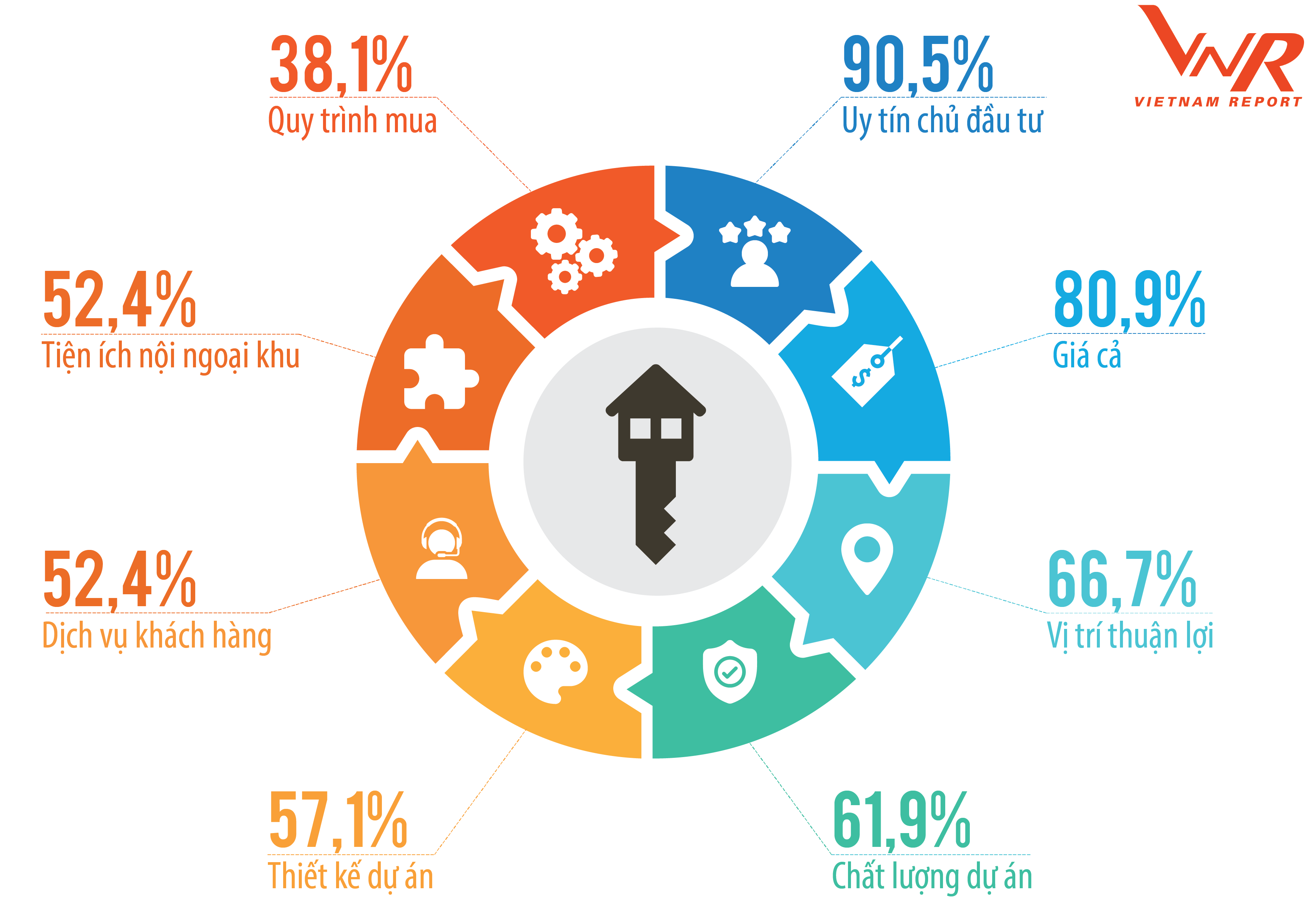
Source: Vietnam Report, Survey of Real Estate Clients, February 2019
In fact, the media plays a particularly important role for the reputation of real estate developers because all actions of the enterprises, from M&A deals, projects to be implemented or entanglements with residents in buildings and apartments, etc... are publicized by the mass media with the rapid spread speed through the internet and especially social networks. Media analysis result in 2018 - 2019 of Vietnam Report showed that big developers such asVingroup/ Vinhomes, Novaland were two brands with the most presence, with dense information coverage on influential newspapers. However, in terms of the "safe" level of information (the positive and negative information difference rate in total number of encrypted information of enterprises), Sungroup is slightly better.
This shows that, in order to effectively communicate and preserve the image and reputation of enterprises, the enterprises need to carefully select information before announcing. With the regular use of media as means to promote products, the most mentioned topic on media of real estate enterprises for the past year have been Product (accounting for 24.7% of total information encrypted volume) while the topic groups of Human Resources, Social Responsibility/ Donation ... are not much mentioned, significantly reducing image diversity of enterprises in the eyes of the community.
Top 5 most mentioned topics of real estate enterprises
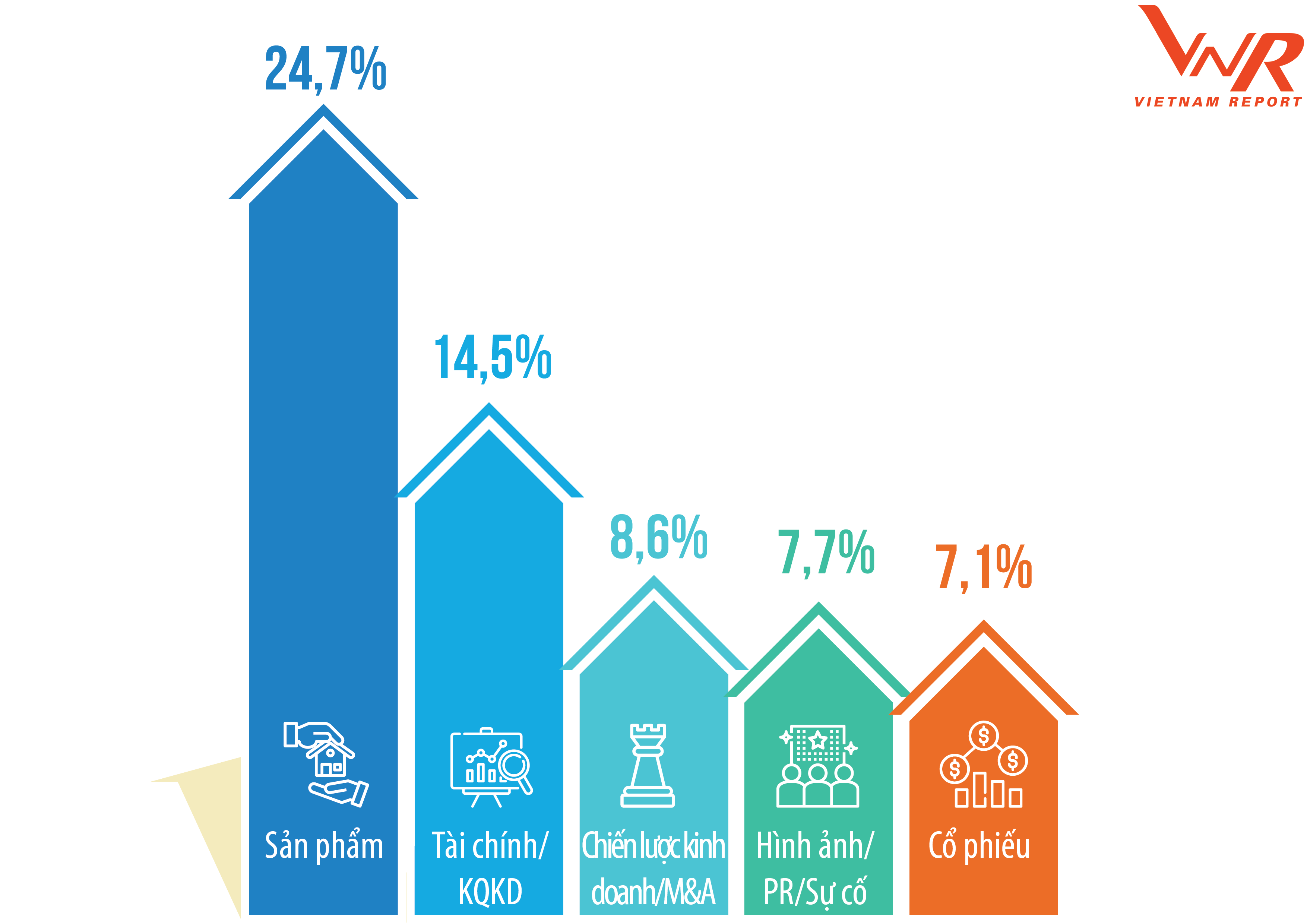
Source: Real Estate Industry Media Coding Data from January 2018 to the end of January 2019
Identification of key trends of real estate industry 2019
According to experts, there are 3 outstanding trends that are expected to drive the growth of the real estate industry:
Firstly, it is the development of green real estate, green - clean - beautiful and environmentally friendly works. There are now a lot of green standards in circulation: Edge (of World Bank's IFC); Green Mark (Singapore), Leed (USA), Lotus..., but in fact there are very few works recognized as "green" in Vietnam. The number of works meeting LEED certificate in Vietnam in 2017 was less than 3%. If compared with Singapore (currently 37% of green construction works), Vietnam is still far behind. The main reason is that the investment capital of these real estates is very big, requiring professionalism from design, construction, use of materials, finishing to operation. In addition, climate change and living environment also significantly affect the "green" standard of the construction works. However, with the increasing demand and spending rate for safe, comfortable and smarter living space of clients, it is certain that green real estate will become a main trend of the industry in the future.
Secondly, industrial zone real estate continues to have potential for growth thanks to the shift of production into Vietnam for the past few years. Vietnam is strategically located in Asia bordering China and many large seaports are connected to industrial zones because the systems of large roads and highways have been being focused on finishing. This is considered a very good investment opportunity for industrial zone developers, especially in the North when the lease demand from large technology corporations such as Samsung, LG ... has been highly growing.
Thirdly, although already cooling down compared to the previous year, real estate for resort - tourism still develops. The latest report of BCG showed that in 2017, Vietnam earned 8.3 billion USD from international visitors, 12.6 billion USD lower than Indonesia; Singapore reached 18.4 billion USD, Thailand reached 52.5 billion USD, the reason was not because the number of tourists entering Vietnam was lower but tourists had less chance to spend money in Vietnam. It can be seen that the development of high-class resorts, entertainment, leisure and shopping services is not really compatible with Vietnam's tourism potential, so developers can continue to research and develop models of shop house, condotel... in a more modern and friendly way with clients.
Besides, according to statistics of CIA World Factbook - 2017, the urbanization rate of Vietnam was only estimated at 35% but Vietnam's urbanization rate was at the top of Southeast Asia reaching 2.6%/year. Along with that, the increase in the number of foreign workers and engineers working in Vietnam was expected to boost the development of residential and apartment real estate in big cities. In fact, the current supply was relatively high in all segments: high class, middle class and low class. Therefore, residential and apartment real estate were forecasted to remain potential but there would have no sudden change in 2019.
Technology application trend in real estate brokerage
Under the evaluation of real estate consulting and brokerage firms, their biggest drawback is currently that sales heavily depend on employees, relationships (network) of employees and collaborators, making the sales costs become quite high, while the efficiency is not really as expected. With the development of technology 4.0 and artificial intelligence (AI), enterprises expect product marketing and potential client search will be improved. Accordingly, the application of information technology will help real estate agents to accurately identify over 70% of clients who have real demand of buying/renting houses. AI application helps the calculation become more accurate, the robot will automatically answer the programmed questions related to the project to ensure continuous interaction with clients...
However, if wanting to apply successfully from current barriers, stakeholders (including technology providers and real estate brokers) need to overcome as follows: (i) forecast changes in behavior of buyers and sellers; (ii) reasonable fees; (iii) technology can’t replace human completely; (iv) trust and prestige. It should be noted that, in the booming era of information technology, especially social networks, clients can openly express their views and assessments of any real estate product/service through the rating. According to a Harvard’s study, every increased rating star equal to 5-10% increase in corporate revenue. Therefore, in addition to information transparency, increasing quality in activities, real estate brokerage enterprises need to pay special attention to the experience and evaluation of clients.
Impact policy and adjustment recommendations
According to the survey of real estate enterprises of Vietnam Report on the assessment of the impact of some policies related to investment and real estate business in effect, remarkably, 21.7% of enterprises said that Circular 19/2017/TT-NHNN had been negatively impacting their business. However, there are also opinions that limiting credit to real estate will encourage enterprises to take the initiative in mobilizing capital instead of credit, minimize the dependence and risks from payable loans, thereby stimulate the development of other capital investment channels such as bond, issuance of additional shares, strengthening investment cooperation with strategic partners...
To support real estate for sustainable growth in the best way, experts pointed out three main solutions:
Firstly, it’s required to be proactive in the strategy of economic development associated with the urban development strategy, consider the strategy of urban development and real estate development as part of the socio-economic development strategy.
Secondly, it’s required to be consistent in planning and implementation of planning, unify the planning of socio-economic development, urban development planning and land use planning.
Thirdly, it’s required to have breakthrough policies in the following issues: (i) creation of land funds; (ii) creation of capital sources; (iii) urban embellishment and development; (iv) infrastructure development, especially urban infrastructure; (v) housing development policies for high-end and affordable segments.
Study method of communication analysis to evaluate the reputation of Agenda Setting theory-based companies on the influences and impacts of mass media on the community and society officially published by two professors Maxwell McCombs and Donald L Shaw in 1968, realized and applied by Vietnam Report and its partners. Accordingly, Vietnam Report used Branch Coding method (evaluating the image of the company on the media) to conduct the analysis of prestige of enterprises operating in the real estate industry in Vietnam.
By vietnamnet.vn




















 TOP
TOP